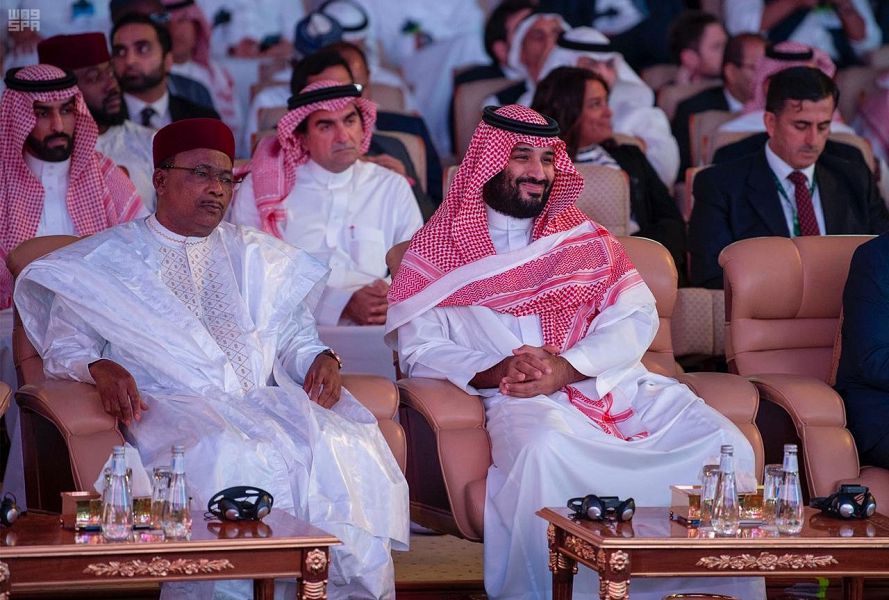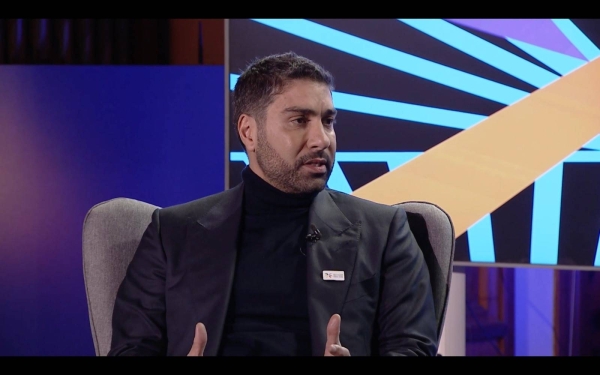
The first day of the Future Investment Initiative (FII) conference in Riyadh made for very compelling viewing, from an economist’s perspective.
The theme of this year’s event, “neo-renaissance,” reflects the fact that when the global economy emerges from the COVID-19 pandemic our lives will have irrevocably changed.
What sets the FII apart from other conferences is that it is anchored in reality, and that leaders in their fields, who are also practitioners, shared their outlooks. Their insights were both visionary and specific.
Day one was remarkably well balanced, both geographically and in terms of themes. The latter included: ways in which investments will shape the global economy; the importance of ESG (Environmental, Social, and Corporate Governance) investing; and the future of healthcare, industry, trade, investment, energy, technology and work, while highlighting the Saudi perspective and leadership.
This broad range of topics is important, because COVID-19 has tested countries and economies in all sectors across the globe. We can only get a better assessment of where this journey will lead us if we investigate all aspects of the changes that have taken place. The list of speakers read like the who’s who of international finance, industry and government.
The key themes weaving through the day were the geographic and sectoral aspects of future investment patterns, as well as the ESG principles of allocating money, and how Saudi Arabia and the other Gulf nations have been affected by those themes was naturally of interest.
There is no question that 2020 was a tough year in terms of the real economy: 225 million people worldwide lost their jobs and global GDP contracted by 3.5 percent, according to the latest statistics from the International Monetary Fund.
However, financial markets fared well during the second half of the year, with equity markets in the US and Asia breaking record after record. This was fueled by trillions of dollars in monetary and fiscal stimulus measures. The question of how the global economy moves forward does not only depend on how quickly key countries can achieve herd immunity through vaccinations, but also how the financial sector will shape the real economy.
It was enlightening to hear leaders thinking through the ways in which liquidity will affect the financial sector and its interconnection with the real economy. Both public and private liquidity will chase investments and goods, which might eventually result in inflationary pressures.
The most pertinent macro-economic/geopolitical observation was that we should expect the renminbi to become increasingly important, as Chinese capital markets have opened up to global investors — from 2 percent in 2015 to 60 percent in 2020. The shift of economic power from West to East was happening before the pandemic, and has been accelerated by it. Expect this trend to continue as the Chinese economy is set to recover more quickly than the rest of the world.
The FII assembled the best brains and they pragmatically shared their thoughts about what it will take to ensure the world uses the pandemic as an opportunity to create a better future.
Cornelia Meyer
One view expressed during the conference was that countries might increasingly localize their supply chains in an effort to be more resilient. This is interesting, particularly in light of the fact that in 2020, foreign direct investment fell from $1.5 trillion to $859 billion. However this does not mean that nations will no longer trade — it is simply a reflection of the fact they are becoming smarter about what parts of their supply chains need to be local for reasons of economic sustainability. This is a trend economists are sure to be watching closely.
So much for the geographic direction of capital flows. In terms of sectors, the pandemic brought tectonic shifts in terms of digitization, technology, and the pharma sector. The starkest example of this is perhaps the fact that previously it had never been possible to develop a vaccine in only 10 months — yet the global pharma/biotech industry has already produced not one but several new vaccines that are already in use. The ways in which we are educated, work and play have also irrevocably changed, and technology is at the heart of the shift.
Accelerated digitalization allowed economic activity to continue as countries went into lockdown. Some nations handled the challenges better than others. Saudi Arabia, for example, did particularly well. The Kingdom’s Minister of Communications and Information Technology Abdullah Al-Swaha told conference delegates how ministers carried out an assessment of the ability of the food industry, medical profession and pharmacies to cope with the lockdown measures, to ensure the population was adequately cared for.
This was a masterclass in how the government and the public and private sectors need to cooperate in times of crisis. The minister was correct when he pointed out that the future belongs to those who have digital acumen. That holds true not only for Saudi Arabia, but for every nation — and has serious ramifications going forward.
The pandemic accelerated digitalization in all sectors, as workplaces, education, meetings, play and healthcare all moved online. Financial technology, or “fintech,” penetration in Saudi Arabia reached 40 percent during the pandemic, which is a good example of the effects on the sectoral level.
On the company level, businesses that had well-developed digital operational capability going into the crisis fared better. Saudi multinational chemical-manufacturing company SABIC was highlighted as one in particular that stood out.
All of the above is powered by energy, a sector that will change over the next few decades as countries aspire to net-zero goals. While global energy demand fell by 6 percent in 2020, demand for renewable energy rose by 1 percent. This trajectory will accelerate.
For example, Total no longer sees itself as an oil company but, rather, as an energy company, CEO Patrick Pouyanne once again pointed out. He warned, though, that the role of gas as a transitional fuel should not be neglected by regulators or investors. He has a point: as energy demand grows alongside an expanding world population, and affordability remains an issue for developing economies, governments need to keep their options open.
The contribution to the conference from Prince Abdul Aziz bin Salman, the Saudi energy minister, was pertinent: he laid out the Kingdom’s strategy to become a world leader not only in oil and gas but in clean and renewable energy, such as blue and green hydrogen. He also highlighted the circular carbon economy and the carbon-sustainability program, which was important. To meet global energy needs, fossil fuels will remain part of the energy mix for decades. A pragmatic approach to dealing with CO2 emissions is crucial if we are to achieve that goal sustainably.
In the years between COP21, the UN Climate Change Conference, in Paris in 2015 and COP26 — which is due to be held in Glasgow, Scotland, in November — the view on climate change has shifted from counting the cost to seeing it as an investment opportunity worth trillions of dollars.
As previously mentioned, ESG was a major theme weaving through all sessions. Here again, the conference convinced with its approach, which demonstrated both intellectual rigor and pragmatism. ESG is the fastest-growing investment class. The main question on investors’ minds is how to measure ESG goals. The Organization for Economic Co-operation and Development, the World Economic Forum, the UN and the International Financial Reporting Standards Foundation are all working toward that goal. Investors demand the ability to measure the impacts of their sustainable investment, which is currently a murky task.
All in all, the way the conference focused on the great reset was visionary, pragmatic and specific. This is really important because the greatest of visions is no good if it cannot be implemented — which is where so many global gatherings miss the point.
The FII assembled the best brains and they pragmatically shared their thoughts about what it will take to ensure the world uses the pandemic as an opportunity to create a better future.
• Cornelia Meyer is a Ph.D.-level economist with 30 years of experience in investment banking and industry. She is chairperson and CEO of business consultancy Meyer Resources.
Twitter: @MeyerResources
Disclaimer: Views expressed by writers in this section are their own and do not necessarily reflect Arab News" point-of-view












